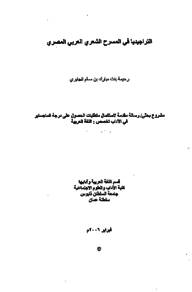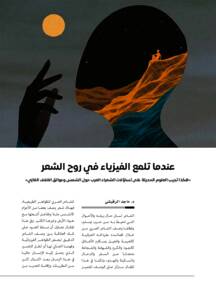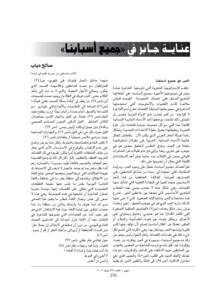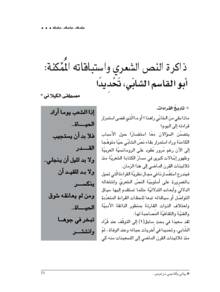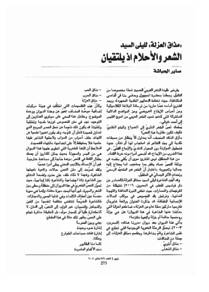Document
التراجيديا في المسرح الشعري العربي المصري
Publisher
جامعة السلطان قابوس
Gregorian
2006
Language
Arabic
English abstract
In an attempt to study "Tragedy " in the Arabic Egyptian poetic theatre through analyzing the texts chosen for the study, the researcher reached the following results:
Shawki and Aziz Abaza have written tragedies related to the surrounding world. They made use of the historical and folklore heritage but their works were affected by the western tragedies. These tragedies were built upon emotion, hence the role of love and death was eminent. Shawki aimed at achieving the moral message. Contrary to the western theatre, the use of narration in the poetic play was clear in Shawki and Abaza's theatre. This led to stagnancy and weakening the depth of the tragedy. Also, the portrayal of characters in these tragedies was very simple. Emphasis was more on structuring the poem than on drama, so it was closer to melodrama. Poetic drama started from the reality of the Arabic peoples taking into their education, taste and aesthetics when using the Arabic heritage. In the new stage of the poetic play in Egypt, there are some attempts of writing modern tragedy with Greek elements carrying some features of the Aristotle hero based on the fact that there are changeable and unchangeable sides in tragedy which are subjected to the circumstances and morals of the time era. The poetic play in its present form followed the western drama and philosophy although it reflects the Arabic and Islamic identity. The free poetry gave the writer a maneuvering space and created a new dramatic dimension to express the experience of the new poet and decrease the weaknesses of the poem. - The function of tragedy expanded to include politics; the tragedy of the hero is the tragedy of his people. The social and political situation was reflected in the poetic tragedy since the Second World War. These two situations were unified in many tragedies expressing the attitude of the dramatic idea towards reality in its wide concept where the group is the hero instead of the individual who dominated this role in the past. The new poetic play used the lyrics and symbolization so it drifted away from stagnancy, directedness and superficiality.
Member of
Resource URL
Arabic abstract
في محاولة الباحثة دراسة التراجيديا في المسرح الشعري العربي المصري، من خلال تحليل النصوص التي تم اختيارها لمادة الدراسة اتضحت النتائج التالية:
• كتب شوقي، وعزيز أباظة أعمال تراجيدية متصلة بالعالم المحيط بهما، حيث قاما بتوظيف التراث التاريخي والشعبي، مع وجود تأثيرات التراجيديا الغربية في أعمالهما. • بنيت هذه التراجيديات على العاطفة؛ فكان دور الحب والموت فيها بارزا. وقد هدف شوقي إلى الوظيفة الأخلاقية في تراجيدياته. • بدء توظيف السرد في المسرحية الشعرية التراجيدية واضحا في مسرح شوقي وعزيز أباظة خلافا للمسرح الغربي؛ مما أدى إلى إضعاف حدة المأساة وجمودها، كما جاء تصوير الشخصيات في هذه التراجيديات بسيطا جدا، وكان التركيز على بناء القصيدة أكثر من الاهتمام بالعمل الدرامي؛ فكانت أقرب إلى الميلودراما. • انطلقت التراجيديا الشعرية العربية منذ نشأتها الأولى من واقع الشعب العربي مراعية تربيته، وذوقه، وحسه الفني والجمالي، حين وظفت التراث العربي. ، في المرحلة الجديدة للمسرحية الشعرية العربية في مصر محاولات في كتابة تراجيديا حديثة بها بعض من جوانب المأساة اليونانية، وتحمل بعضا من صفات البطل الأرسطي، من منطلق أن هناك جوانب ثابتة وجوانب متغيرة في التراجيديا تخضع الظروف العصر وأخلاقه. • إن المسرحية الشعرية التراجيدية في صورتها المعاصرة، اقتفت آثار الغرب في الدراما وفلسفتها، مع أنها تحمل الخصوصية العربية الإسلامية.
• كتب شوقي، وعزيز أباظة أعمال تراجيدية متصلة بالعالم المحيط بهما، حيث قاما بتوظيف التراث التاريخي والشعبي، مع وجود تأثيرات التراجيديا الغربية في أعمالهما. • بنيت هذه التراجيديات على العاطفة؛ فكان دور الحب والموت فيها بارزا. وقد هدف شوقي إلى الوظيفة الأخلاقية في تراجيدياته. • بدء توظيف السرد في المسرحية الشعرية التراجيدية واضحا في مسرح شوقي وعزيز أباظة خلافا للمسرح الغربي؛ مما أدى إلى إضعاف حدة المأساة وجمودها، كما جاء تصوير الشخصيات في هذه التراجيديات بسيطا جدا، وكان التركيز على بناء القصيدة أكثر من الاهتمام بالعمل الدرامي؛ فكانت أقرب إلى الميلودراما. • انطلقت التراجيديا الشعرية العربية منذ نشأتها الأولى من واقع الشعب العربي مراعية تربيته، وذوقه، وحسه الفني والجمالي، حين وظفت التراث العربي. ، في المرحلة الجديدة للمسرحية الشعرية العربية في مصر محاولات في كتابة تراجيديا حديثة بها بعض من جوانب المأساة اليونانية، وتحمل بعضا من صفات البطل الأرسطي، من منطلق أن هناك جوانب ثابتة وجوانب متغيرة في التراجيديا تخضع الظروف العصر وأخلاقه. • إن المسرحية الشعرية التراجيدية في صورتها المعاصرة، اقتفت آثار الغرب في الدراما وفلسفتها، مع أنها تحمل الخصوصية العربية الإسلامية.
Category
Theses and Dissertations

